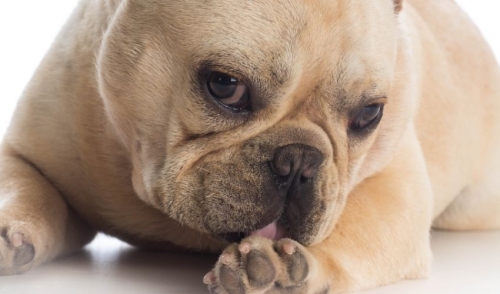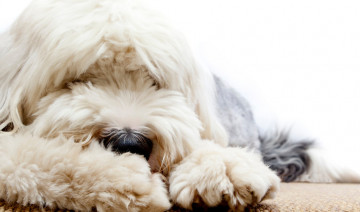10 Symptoms of Diabetes in Dogs
Diabetes can be a challenging condition to manage, especially in pets that cannot verbally communicate how they feel. Recognizing the symptoms of diabetes in...

Licking is one way a dog senses its world, and occasional licking is perfectly normal behavior and nothing to be concerned about. When your dog licks excessively, however, it can be an indication of underlying problems, or the licking itself could cause problems and injuries. Understanding why your dog licks can hep you identify any potential difficulties and redirect your dog’s behavior.
Licking is normal behavior for a dog to groom itself, express affection, and taste objects, and some casual licking can be comforting and soothing to the animal. Too much licking, however, is when the dog never stops, even when prompted or distracted. Dogs that lick excessively may focus on one area, such as a paw, their muzzle, or their genitals, or they may lick objects such as walls, carpeting, or furniture.
Excessive licking can indicate a range of health problems, including allergies, skin irritations, arthritis, joint or muscle soreness, nausea, or overall anxiety. Over time, too much licking can lead to hair loss and skin infections, in addition to the underlying problems that precipitated the licking.
The key to stopping your dog’s excessive licking is to identify and treat the cause of the behavior. Note where and when your dog licks, how prolonged the behavior is under different conditions, and whether you are able to distract your dog from licking. Consult your veterinarian for a proper diagnosis and to investigate any underlying health considerations that may be prompting the licking. To help keep your dog from licking excessively…
Most importantly, do not punish your dog for excessive licking. The dog is only trying to soothe itself or communicate distress, and punishments will be ineffective at addressing the cause of the behavior. Dogs can lick for many reasons, and it can be a complex process to thoroughly understand your dog’s licking. Instead, be patient as you try to discover why your dog licks excessively, and once you find the cause, take steps to ease your pet’s discomfort. When the discomfort is gone, the undesirable behavior will also be gone.
We are constantly adding new specials to our site. Be sure to check back often!
We currently do not have any events scheduled.

Diabetes can be a challenging condition to manage, especially in pets that cannot verbally communicate how they feel. Recognizing the symptoms of diabetes in...
Comments